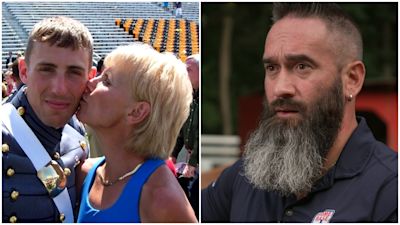The mental health crisis stalking America's returning troops

There are many grim statistics that mark America's lost war in Afghanistan.
It was a 20-year conflict that cost well over $2 trillion.
It saw the death of 2,500 American servicemen and women, over 450 British troops, and at least 50,000 Afghan civilians.
But there is another death toll that is just as devastating, and it will not end anytime soon.
Every single day in America approximately 20 veterans are dying from suicide.
In other words, the war is over, but the death toll continues to mount relentlessly, and will continue to do so for years to come. There is a hidden tragedy playing out behind closed doors in communities across America, similar to the experiences endured by US veterans who returned from Vietnam.
In the same way as many Vietnam vets couldn't adjust to life back home, so US soldiers returning from the Afghan battlefield are facing similar struggles.
The humiliating exit from Afghanistan, the harrowing images from Kabul airport, and the stark reality of the US defeat are all exacerbating the sense of hopelessness. Many soldiers who risked everything are now left asking whether the war was worthwhile, deepening their despair.
Some veterans are not getting the support they need and see no way to deal with their traumatic experiences.
I have been exploring this issue in Massachusetts and Virginia, speaking to those trying to overcome their inner demons.
Matt Heisey died by suicide after two tours in Afghanistan.
His mother told me that he returned a changed man, and no amount of family or medical interventions helped.
He left behind a wife and two small daughters. In his final note to his mother he wrote that he felt like a man trapped in a burning building.
There is help available to others, especially from private organisation like Boston-based Home Base, a charity that is trying to reach veterans facing a mental health crisis.
Home Base runs intensive courses to help serving and former soldiers come to terms with their PTSD, with techniques to manage depression, anxiety, and loneliness.
It is a deeply impressive effort - funded in part by Boston's famous Red Sox baseball team - and entirely free for the veterans who seek help. But the organization cannot reach everyone, especially those who return to rural America.
There are many innovative treatment schemes for traumatized veterans in the Boston area, including what is known as equine therapy.
We saw this being used by Ryan Casavant, who took part in intense fighting in both Afghanistan and Iraq.
He has found a deep emotional connection with horses that has helped him deal with his anxiety. Ryan is now helping other veterans use equine therapy.
America sent its young men and women to a war that lasted for twenty years.
The soldiers have now come home. But many are finding that they have a final enemy to confront, one that is even more dangerous and devious than the Taliban: Depression and PTSD.
On Assignment airs on ITV at 10.45pm tonight